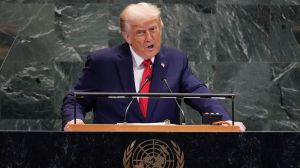Unrest topples studies, Kurdish students ready to rush back
Lack of avenues for education in Iraqi Kurdistan brought them to India.
 The students at their hostel.
The students at their hostel.
As their homeland stares at a full-fledged war with the Islamic State in Iraq and the Levant (ISIS), several Iraqi Kurd students in the city are in a quandary. Lack of avenues for education in Iraqi Kurdistan brought them to India, but the unrest has affected their academic aspirations.
Some of them say if matters worsen” “books shall be dropped and all roads will lead back home to answer the call of duty.”
Halo Qader (28) at the International Students Hostel, University of Pune (UoP), is pursuing a Masters degree in English. Fellow Kurds Salar Fadhil (28), a student of Computer Science at UoP, and Barzan Mustafa (26), a final year LLM student at New Law College, Bharatiya Vidyapeeth Deemed University, discuss how the situation back home could affect their future.
Qader was a banker before he came to India a couple of years back and Mustafa ran the family business of fitting water tanks. For many young Kurds, a reasonably good spoken English fetches better jobs with multi-national companies, which have recently diverted their attention to the Iraqi Kurdistan Region. The average Kurd student wouldn’t opt for colleges in Arab countries which, besides being prejudiced against Kurds, espouse Arabic as medium of instruction. Besides, India offers the most economical option.
Along with events at the Iraqi Kurdistan border, another crisis has begun to haunt students. They are cash-strapped. Both Qader and Mustafa rely on their families for sustenance” “I’m out of cash, says Qader, adding” “I asked my family to send money about a couple of weeks back. They called me and asked me to wait for another two. Can’t blame the”.” Mustafa says” “My landlord is very particular about rent. A parched bank account in the first week of the month could result in evictio”.”
Fadhil who taught math at a government school, is on paid leave to pursue higher education. His salary usually arrives on time, but he received none in the past three months” “The chaos has the entire economy paralysed,” he says.
Why destination India?”
Kurdish people divided among four countries Iran, Turkey, Syria, and Iraq have been fighting for independence. In 1991, Kurdistan obtained autonomy from Iraq. But development was limited. Some Turkish and Iranian companies tried setting up factories in the region, but Kurdistan was still under the shadow of Saddam. After the fall of Saddam, things changed in Kurdistan. “The increase in companies led to an increase in students going abroad for studies as Kurdistan lacks good colleges. The government started giving scholarships to students going abroad for studies,” said Fadhil.
“India is a good choice as many of our seniors have studied here. It is cheaper too,” added Fadhil.
Though there are no official records, Kurdish students’ tryst with India began in 1984 when five Kurdish students came to India for post graduation, said Nasir Ali who used to work at the Ministry of Arts and Culture in Kurdish government and now works as producer at Media Network Rudaw. “After that, there was a gap of almost 24 years before the next set of three Kurdish students arrived to complete their Masters degree. Since then there have been many students,” added Ali.
What next”
“With ISIS on the borders, we do not know what our future will be like. There have been small fights between Peshmarga (armed forces of the Kurdistan Regional Government) and ISIS…,” says Ali. “Peshmarga is stronger than ISIS now,” he adds.
Education is getting affected, say students. “This year, there are only 20 students in Pune from Kurdistan as opposed to about 200 last year,” says Mustafa. In the event of a full-blown war, Qader says Kurdistan’s boys and girls will join the fight.







